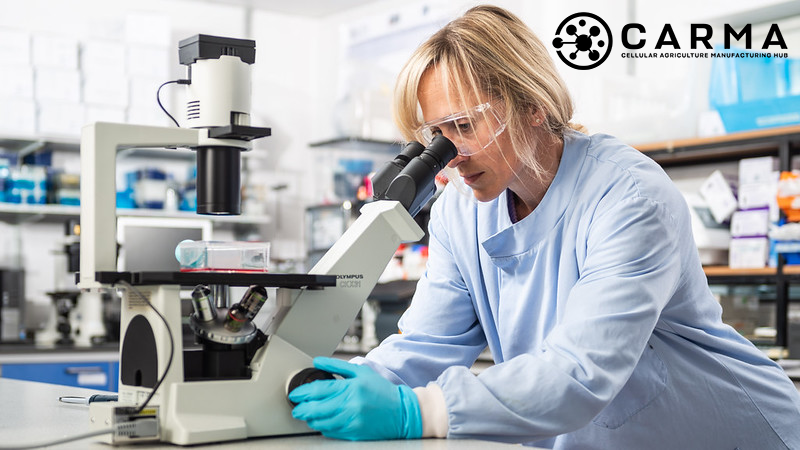Budget
£12 million
Project status
In progress
Duration
1 Oct 2023 to 30 Sep 2030
£12 million
In progress
1 Oct 2023 to 30 Sep 2030

Cellular agriculture is the production of food and other consumables, traditionally grown on the land/in the sea, in a bioprocess by utilising cells.
Our vision is for a just transition to environmentally, economically, and socially sustainable food systems.
Our mission is the integration of transdisciplinary responsible approaches for novel cellular agriculture tools and technologies, into current food systems, to deliver sustainable food manufacturing in the UK and beyond.
We will deliver the objectives via integrated and interconnected Work Packages (WPs).
The outputs will focus on achieving high process yield with the desired quality (nutritional profile). We will achieve this by increased cell densities, resource demand reduction (feedstocks and energy), and increased output per cell. We will do this through bioreactor design, including enhanced mass transfer of nutrients and waste, novel gas exchange, and continuous harvesting. This work package will firstly use the bioreactor technologies under development at Bath and UCL, for both tissue engineering (TE) and precision fermentation (PF) cellular agriculture.
This work package focuses on innovative high-purity, low-loss downstream processes coupled with water recycling and resource recovery. Firstly, we'll assess if separation technologies developed for traditional biotech, e.g. low-shear tangential flow filtration (TFF) or hollow-fibre perfusion can be used for Cell Ag. This is a largely unexplored area and we will begin with equipment already in use at Bath to accelerate this step. WP 2 will then focus on unmet material and process needs, increasing recovery and reducing environmental burden, matching WP1 stream loads and composition with iterations guided by WP4.
This work package focuses on development of low-cost, low-environmental impact, ethically sourced consumer-accepted cells and culture media ingredients for cultured meat production. This will be met by efficient proliferation of cells that sustain as much as possible the natural in vivo characteristics, either maintaining or enhancing nutritional profiles for human nutritional health. This WP will provide robust and fundamental science to underpin the supply chain.
This work package focuses on the design choices involved in scaling up the supply chain of UK Cell Ag manufacturing. Given the significant opportunity to create net zero supply chains (WEF, 2021), we will analyse future scenarios that leverage life-cycle assessment and whole-life value analysis, to provide manufacturers with a road map to building cost effective, high quality, sustainable and secure supply chains.
This work package focuses on analysing the impact of Cell Ag on society. Key issues include Cell Ag and the public, the economics of Cell Ag and the links between Cell Ag and various aspects of UK and international policy. We will deliver a multifaceted analysis of the social aspects of cellular agriculture, collecting a diverse range of empirical data - stakeholder interviews, surveys, focus groups, consumer experiments - to horizon scan future scenarios and advocate their significance within the Cell Ag community.
Interested in joining our citizens assembly? Email Dr Neil Stephens: n.stephens@bham.ac.uk
By delivering informed dialogue and deep listening about Cell Ag, work package 6 will ensure society is both engaged with this emerging field and has scope to feedback and shape its development. We will focus on communicating with citizens, media, policymakers and the most affected sectors, including farmers, food producers and sellers and their representative bodies.
Find out who we are.
We are a team of academics, researchers and professionals based across universities in the UK.
CARMA is funded for seven years with a £12m EPSRC Sustainable Manufacturing Hub grant, and with contributions from our industrial and university partners.
Our funding structure uses a hub and spoke model for the academic partners: the University of Bath is the ‘hub’ and Aberystwyth University, the University of Birmingham, the Royal Agricultural University and UCL are the ‘spokes’.
There is ongoing opportunity for new industry partners to join, and there will be three to six additional ‘spokes’ through a competitive selection midway through the project.
Achieving a just transition to environmentally, economically, and socially sustainable food systems requires a coordinated international effort, and we are pleased to be working with like-minded consortia across the world. Details will be added here in due course.
Please get in touch if you would like to be added to our circulation list, or to find out more about becoming a member.